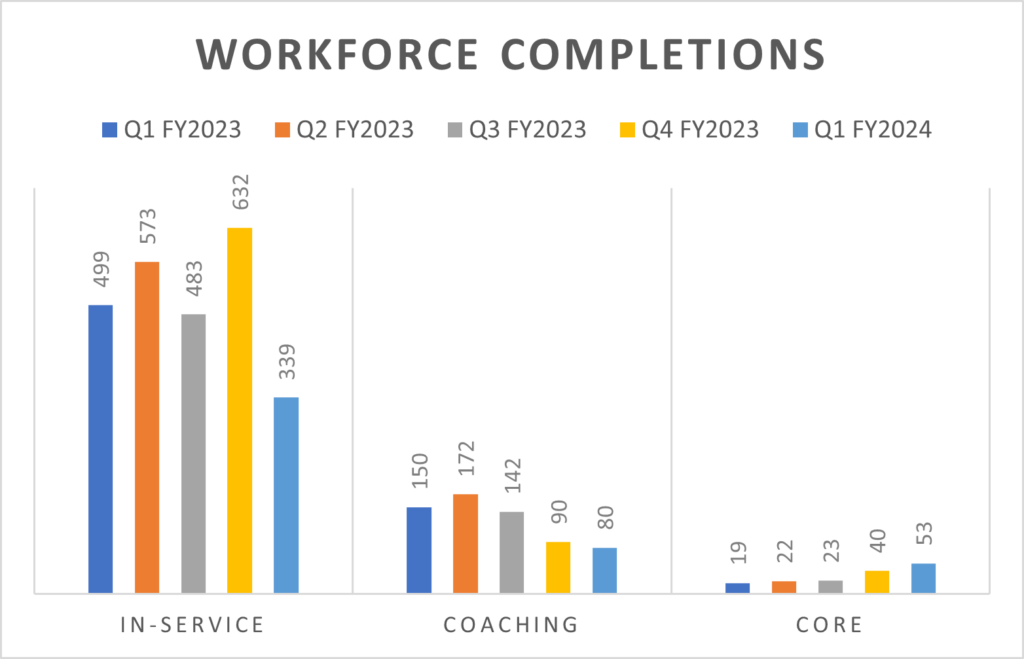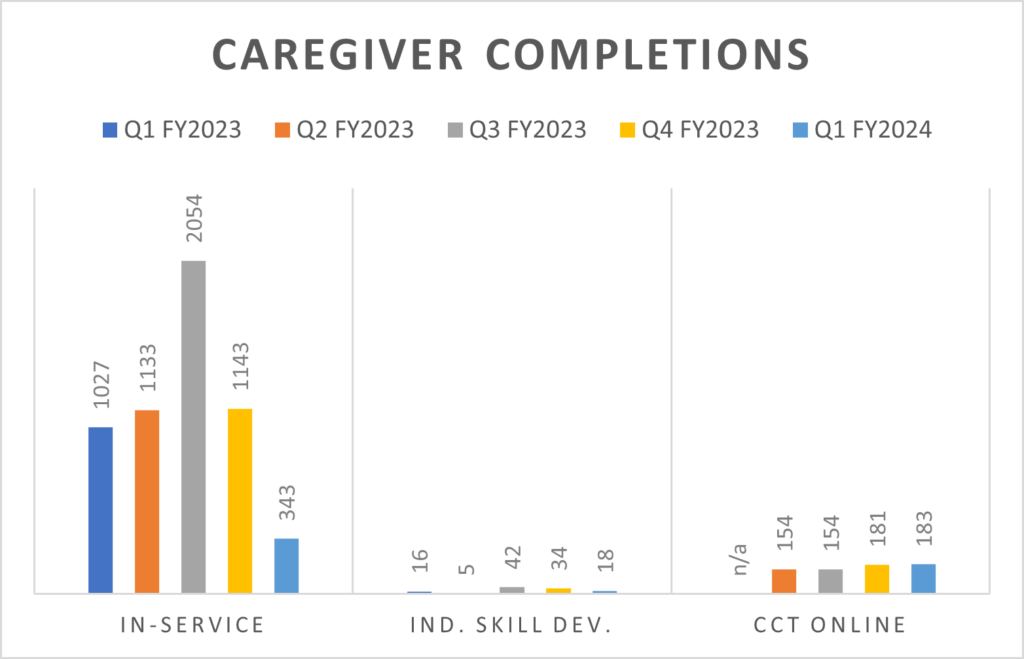Quarterly Report_Q1 FY2024
Program Updates
Supervisors Conference
The Alliance hosted this year’s Supervisors Conference on Sept. 26 and 27 at the Hyatt Regency Lake Washington.
There were 192 registered attendees and the survey received a 42% response rate.
- 100% of respondents noted that the in-person setting was effective for connecting with others.
- General session topics focused on motivation and inspiration, with keynotes on finding opportunity in crisis and the personal story from a young man who had experienced care. There were also general sessions on handling difficult conversations, the fentanyl epidemic and trauma-informed supervision.
- Breakout content included building leadership skills; the Cycle of Reflecting; internal program updates on Service Array, ICW and FFPSA; mindfulness; courts and HB1227; how to prepare for stress and trauma; and how to focus energy and attention.
By the Numbers
“Finding the Bright Sides”
— speaker Amelia Franck-Meyer
“This session was amazing! Especially in current climates, finding the positives and remembering why we do what we do is invaluable.”
Attendee feedback
“My Journey”
— speaker Mark Anthony Garrett
“He was charismatic, engaging, and inspiring. As the parent of a disabled child, he gave me hope for my own child's future in a world that is very, very unkind to anyone who is different. It was a wonderful way to end the conference!!”
Attendee feedback
New data for Shelter Care Simulation training
The Shelter Care Simulation training launched in late July 2023 in response to HB1227 implementation. This training was made in collaboration with DCYF HQ Program Managers and to complement their Foundations of Practice trainings developed to support the field. The Alliance has been offering simulation and debriefing in Regional Core Training since 2017 and is excited to bring this to the field as an opportunity for in-service/on-going for field staff.
Shelter Care Simulation was offered in multiple offices across the state with strong involvement of judicial officers and AAGs. DCYF regional QPS staff offered pre-learning on the new standards for shelter care hearings prior to the simulation training offered by Alliance.
Among 254 DCYF staff who responded to the evaluation survey, about two-thirds were from CPS Investigations and FAR programs.
While 80% of learners had spent at least an hour preparing for the simulation, many felt that more time was needed to become familiar with the facts of the case scenario. Learners also voiced that they would benefit from clearer communication ahead of time to understand the expectations about preparation, their assigned time slot, and to have a clear picture that the simulation event was primarily designed to be an immersive courtroom experience followed by feedback and debriefing.
By the Numbers
"It felt realistic. I felt nervous before and during the simulation, which got me out of my comfort zone."
Attendee feedback
ICW trainings update
The Indian Child Welfare (ICW) Policy Rollout eLearning introduces upcoming ICWA policy updates and changes. In addition, the eLearning provides a brief history of the federal Indian Child Welfare Act (ICWA) and the Washington State ICWA and shares some definitional terms. Learners appeared to take from the eLearning largely what was intended: a concise overview of the history of ICWA, an introduction to upcoming policy and definition additions and revisions, and an explanation of the upcoming required in-person policy training.
Learner surveys had a response rate of 34% (n=175). When asked what was most useful, learners responded positively to the inclusion ICWA history and current policies. One learner mentioned it was useful to learn “the history of ICW through the timeline” and another appreciated receiving “a basic understanding of what policies will be discussed and more upcoming changes.” Suggestions for improvement included a desire for additional content, inclusion of voices of lived experience, and improved navigation and narration.
By the Numbers
Core trainings development continues
The Alliance continues work re-envisioning its Core trainings.
The Workforce Core pilot will roll out with the Jan. 1, 2024, cohort. This is the foundational training for new social service specialists. Workforce Core will expand upon the strengths of Regional Core Trainings. There will be increased opportunity for simulation, more connection between transfer of learning activities in the field and the classroom, and coaching for skills development.
The redesign of Caregiver Core Training is also in development.
Training Summary


* A unique learner is each individual learner who has taken any class this quarter, whereas the total number of learners will count a learner each time for each course they complete. The number of unique learners includes eLearning learners.
